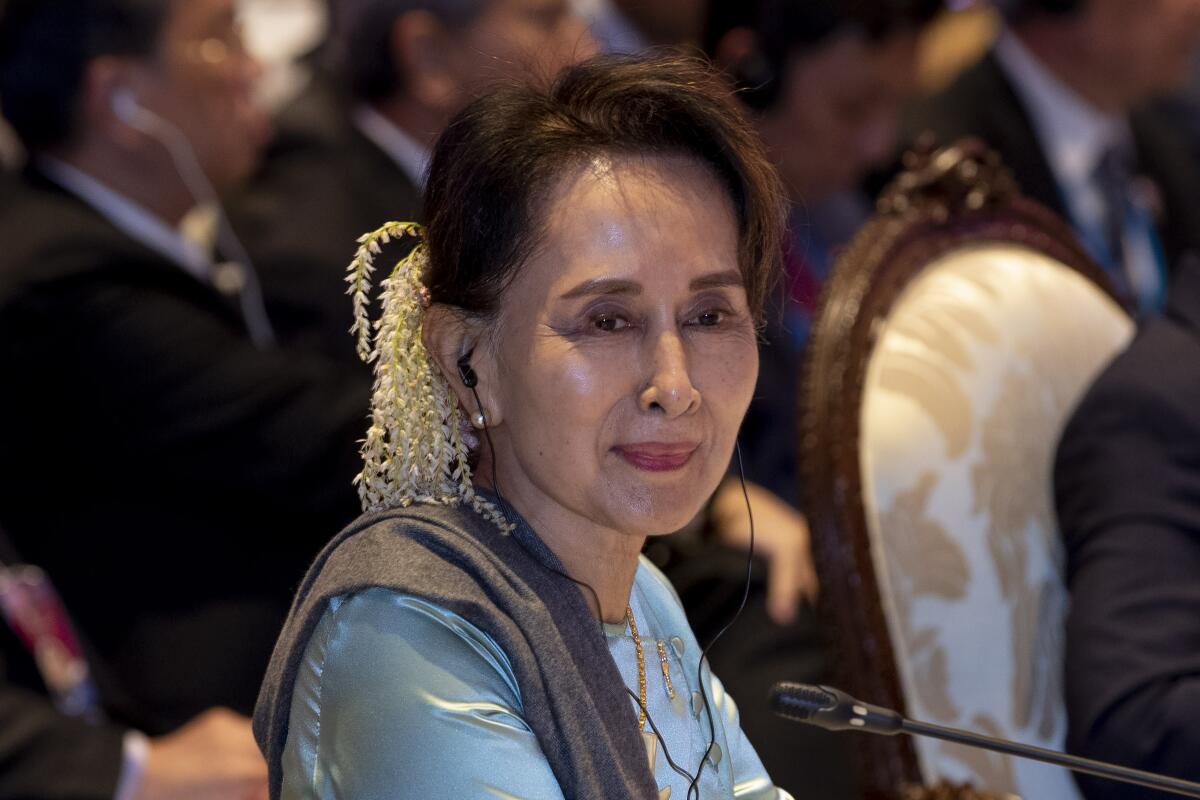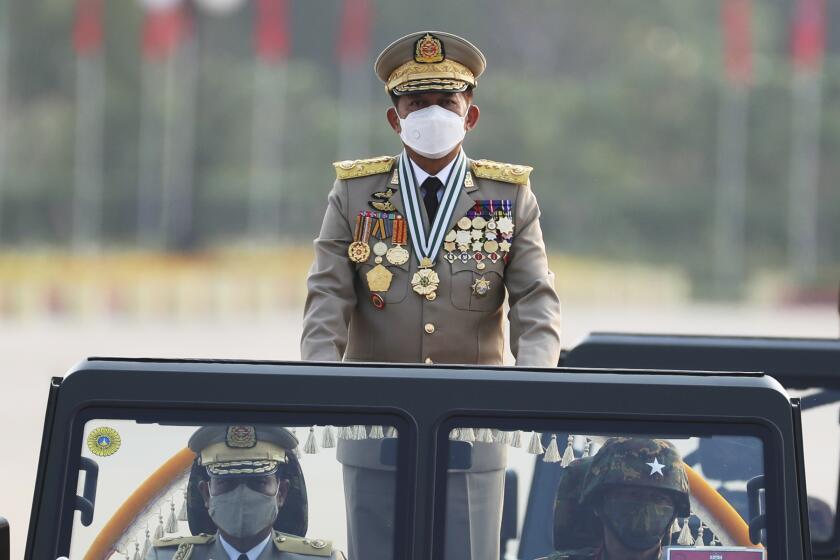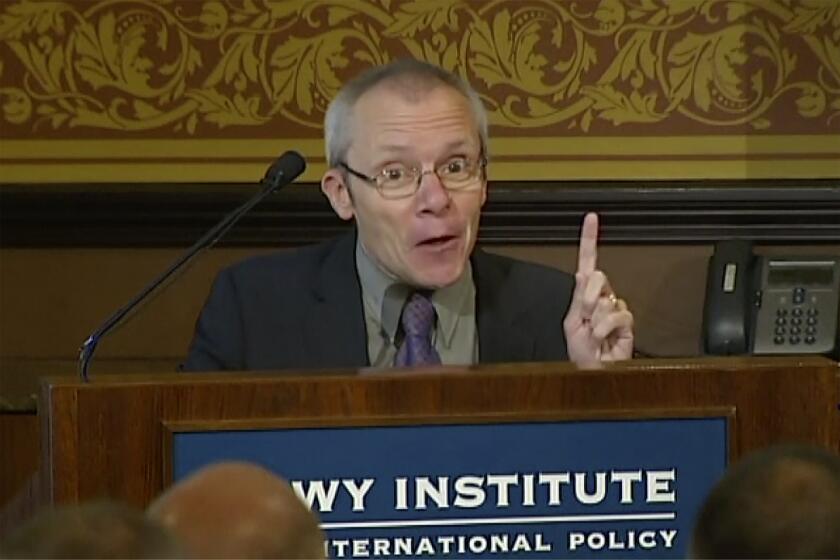Myanmar court again finds ousted leader Aung San Suu Kyi guilty of corruption

BANGKOK — A court in military-ruled Myanmar on Friday convicted the country’s ousted leader Aung San Suu Kyi of corruption, sentencing her to seven years in prison in the last of a string of criminal cases against her, a legal official said.
The court’s action leaves her with a total of 33 years to serve in prison following a series of politically tinged prosecutions since the army toppled her elected government in February 2021.
The case that ended Friday involved five offenses under the anti-corruption law and followed earlier convictions on seven other corruption counts, each of which was punishable by up to 15 years in prison and a fine.
The 77-year-old Suu Kyi has also been convicted of several other offenses, including illegally importing and possessing walkie-talkies, violating coronavirus restrictions, breaching the country’s official secrets act, sedition and election fraud.
All her previous convictions had landed her with a total of 26 years’ imprisonment.
Suu Kyi’s supporters and independent analysts say the numerous charges against her and her allies are an attempt to legitimize the military’s seizure of power while eliminating her from politics before an election it has promised for next year.
An escalation of fighting in Rakhine state is overextending the junta’s forces and giving local ethnic insurgents an opportunity to consolidate power.
In the five counts of corruption decided Friday, Suu Kyi was alleged to have abused her position and caused a loss of state funds by neglecting to follow financial regulations in granting permission to Win Myat Aye, a Cabinet member in her former government, to hire, buy and maintain a helicopter.
Suu Kyi was the de facto head of government, holding the title of state counselor. Win Myint, who was president in her government, was a co-defendant in the same case.
Friday’s verdict in the purpose-built courtroom in the main prison on the outskirts of the capital, Naypyitaw, was made known by a legal official who insisted on anonymity for fear of being punished by the authorities. The trial was closed to the media, diplomats and spectators, and her lawyers were barred by a gag order from talking about it.
The legal official said Suu Kyi received sentences of three years for each of four charges, to be served concurrently, and four years for the charge related to the helicopter purchase, for a total of seven years. Win Myint received the same sentences.
The defendants denied all the charges, and her lawyers are expected to appeal in the coming days.
The end of the court cases against Suu Kyi, at least for now, raises the possibility that she would be allowed outside visitors, which she has been denied since she was detained.
The military government has repeatedly denied all requests to meet with her, including from the Assn. of Southeast Asian Nations, which seeks to help mediate an end to the crisis in Myanmar that some United Nations experts have characterized as a civil war because of the armed opposition to military rule.
A U.S. citizen who returned to his homeland of Myanmar is one of four foreigners being released by the country’s military junta in a prisoner amnesty.
The U.N. announced after its special envoy, Noeleen Heyzer, met in August with Senior Gen. Min Aung Hlaing, the head of Myanmar’s military-installed government, that he “expressed openness to arranging a meeting at the right time” between her and Suu Kyi.
A statement from the military government said: ”Depending on the circumstances after the completion of the judiciary process, we will consider how to proceed.”
Suu Kyi is currently being held in a newly constructed separate building in the prison in Naypyitaw, near the courthouse where her trial was held, with three policewomen whose duty is to assist her.
Allowing access to Suu Kyi has been a major demand of the many international critics of Myanmar’s military rulers, who have faced diplomatic and political sanctions for their human rights abuses and suppression of democracy.
State-controlled media reported last year that Win Myat Aye, the figure at the center of the corruption case that ended Friday, used the rented helicopter for only 84.95 hours between 2019 and 2021, but paid for a total of 720 flight hours, which resulted in a loss of more than $3.5 million in funds.
The state-run Global New Light of Myanmar newspaper said he also allegedly failed to follow official procedures in buying the state-owned helicopter, resulting in a further loss of $11 million.
Win Myat Aye is now minister of Humanitarian Affairs and Disaster Management in the National Unity Government established as a parallel administration by elected legislators who were barred from taking their seats when the military seized power last year. The military has declared NUG to be an outlawed “terrorist organization.”
Suu Kyi, the daughter of Myanmar’s martyred independence hero Gen. Aung San, spent almost 15 years as a political prisoner under house arrest from 1989-2010.
Her tough stand against the military rule in Myanmar turned her into a symbol of nonviolent struggle for democracy, and won her the 1991 Nobel Peace Prize.
Her National League for Democracy party initially came to power after easily winning the 2015 general election, ushering in a true civilian government for the first time since a 1962 military coup.
But after coming to power, Suu Kyi was criticized for showing deference to the military while ignoring atrocities it is credibly accused of committing in a 2017 crackdown on the Muslim Rohingya minority.
Her National League for Democracy party won a landslide victory again in the 2020 election, but less than three months afterward, elected lawmakers were kept from taking their seats in Parliament and top members of her government and party were detained.
The army said it acted because there had been massive voting fraud in the 2020 election, but independent election observers did not find any major irregularities.
The army’s takeover in 2021 triggered widespread peaceful protests that security forces tried to crush with deadly forces and that soon erupted into armed resistance.
According to a detailed list compiled by the Assistance Assn. for Political Prisoners, a non-governmental organization that tracks killings and arrests, Myanmar security forces have killed at least 2,685 civilians and arrested 16,651.
On Wednesday last week, the U.N. Security Council called on Myanmar’s military rulers to release all “arbitrarily detained” prisoners including Suu Kyi in its first resolution on the situation in Myanmar since the army’s seizure of power.
The U.N. resolution also calls for an immediate end to violence in Myanmar and urges all parties in the country to work on starting a dialogue and reconciliation aimed at peacefully resolving the crisis.
Myanmar’s foreign ministry retorted that the situation in the Southeast Asian country solely concerns internal affairs that pose no risk to international peace and security.
More to Read
Sign up for Essential California
The most important California stories and recommendations in your inbox every morning.
You may occasionally receive promotional content from the Los Angeles Times.












